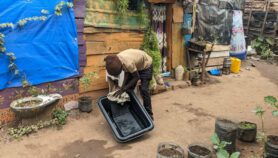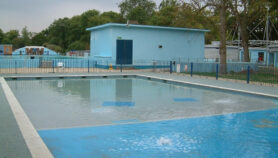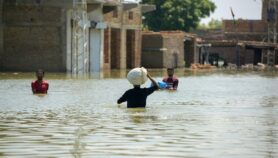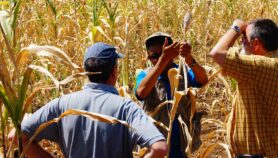By: Linda Nordling
Send to a friend
The details you provide on this page will not be used to send unsolicited email, and will not be sold to a 3rd party. See privacy policy.
Africa's next big science investment should target its oceans, but funding and political support need to be sustained, writes Linda Nordling.
Last year, African space science had a big change in fortune. The allocation of more than half of the US$2 billion Square Kilometre Array (SKA) radio telescope ― a global science and engineering project ― to the continent opened the floodgates for funding, especially for equipment and an expansion of research training.
But there is another important area that requires similarly massive investment: marine science.
A new maritime plan — "2050 Africa's Integrated Maritime Strategy" — could do for African ocean science what the SKA has done for astronomy.
But while the plan looks good on paper, it remains to be seen whether African governments are prepared to provide the sustained funding and long-term political support required to turn the dream into reality.
Certainly, the continent has need for marine science: the waters around Africa are among the least studied in the world. Research is needed to tackle the enormous challenges that industries such as fishing, oil drilling, tourism and shipping pose for marine areas.
Scientists estimate that only half of the marine species off the eastern coast of Africa have been scientifically described. And for known species, questions remain, such as where they live and what they need to survive.
Ocean dynamics around Africa are also poorly understood. Thanks to satellites, scientists have a reasonably good idea of what happens on the surface. But anything below a few centimetres requires measurements to be taken in situ. Large swathes of African waters have not been studied at all, due to a lack of funding and equipment such as ocean-going research vessels.
Filling the gaps
"The further offshore you get, and the deeper you get, the less we know," says James Stapley, communications and IT coordinator of the Agulhas and Somali Current Large Marine Ecosystems Project. The project is funded by the Global Environment Fund with the help of the UN Development Programme to study the waters off Africa's eastern coast.
But current efforts are not enough. African ocean scientists have a long what-to-do list. The continent needs training programmes, ocean-going research vessels ― there are none currently outside South Africa ― and expensive oceanographic equipment such as buoys that can collect long-term data sets.
This requires a step-change in investment — both from African nations and from international donors. Here the maritime strategy, which was ratified last December (2012) by ministers responsible for ocean affairs, offers a glimmer of hope.
In addition to boosting intra-African sea trade, improving seafarer security and protecting marine environments, the document also proposes big investments in ocean-related research.
It says it will coordinate and support research, pool maritime data, train new scientists and draw up a dedicated African marine research programme. A continental research centre — the Oceans and Seas Research Institute of Africa — is also proposed.
But the document isn't perfect. One might question the wisdom of trying to gather all African ocean research efforts in a single centre. Perhaps a regional approach would work better, with three centres or networks focusing on the Atlantic Ocean, the Indian Ocean and the Mediterranean Sea respectively.
The education and public outreach section of the document could also use some extra thought. The series of giant African aquariums proposed by the strategy could work as tourist attractions and may attract many young African people, who are often the target of science outreach programmes. They are the ones who might become interested in marine science and train to be scientists or technicians as a result.
But such efforts are an expensive way of reaching a small number of people. Realistically, few among Africa's coastal population are likely to set foot in these giant aquariums — not because of a lack of interest, but because of an inability to travel to them.
Commitment to change
Despite these worries, the African maritime strategy is an encouraging document and political will is evident in it.
The long time frame that the document plans forechoes this strong commitment to change. Some activities, such as training of marine scientists, run between now and 2030. Others, like establishing a common African maritime trading zone, are pegged to be completed by 2050.
Although such long time frames are essential for ocean science, which depends on sustained monitoring over many decades, time can also be the enemy of political action. Politicians look for short-term gains, and their ambitions often falter beyond the next election.
There is a risk that the long-term timeframe of the strategy's actions could cost African ocean science its new beginning. The astronomers overcame a similar problem by focusing on a short-term goal: being jointly awarded the SKA project is a matter of national and continental pride, even if the completed project is actually about a decade away.
Perhaps it is time for ocean researchers to think big — bigger than they have dared to think before — and dream up research projects that could sway indecisive political minds, just as the SKA persuaded ministers. The health and future productivity of the oceans around Africa may depend on it.

Journalist Linda Nordling, based in Cape Town, South Africa, specialises in African science policy, education and development. She was the founding editor of Research Africa and writes for SciDev.Net, Nature and others.
This article has been produced by SciDev.Net's Sub-Saharan Africa desk.













